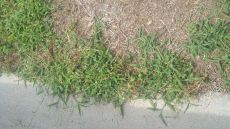As we are embraced in a terrible heat wave, our lawns will begin to go downhill if this weather continues to be hot, humid, and dry. In previous newsletters we've discussed proper watering and mowing to help prepare for and battle the summer heat (if you need more info on those topics please let us know). You may know that fescue can begin to brown with this hot weather. I have some pictures to help you identify heat stress. I also have included pictures of some common problem weeds to help you understand what they are.
Heat stress - is very common in our area as most of us have fescue grass, which is a cool season turf. Fescue prefers 70 degree temps during the day and 50's at night. As we are getting blasted by 90+ temperatures fescue will start to stress and brown. We live in what is referred to as a Transition Zone, where we can host all turf types. For fescue turf, that means in spring and fall it will thrive, and in summer it will struggle. The deeper and more established your roots are the longer your fescue will remain healthy. When the first signs of heat stress show in your lawn, the only cure is to water those spots for a long period of time for a couple of days (meaning 40-45 minutes depending on grading and drainage). It will bounce back.
 |
| Early Stages of Heat Stress |
 |
| Late Stages of Heat Stress |
Crabgrass - is an annual summer grassy weed that is one of the worst pests in lawns for our area. A yearly pre-emergent can be applied to help prevent crabgrass, however timing of the application is vital. Pre-emergents do not last forever. These treatments degrade after a certain length of time because of two common factors from Mother Nature: sunlight and rainfall. These elements will break down the barrier created by the pre-emergent and leave your lawn susceptible again. Crabgrass has four life stages to its life-cycle. It is easiest to kill when in the first and last stages of the plants life. There are post-emergent herbicides to spray on crabgrass during the summer months. However, the best defense to prevent crabgrass and all other weeds is........DENSE, HEALTHY TURF!!!!!
 Dallis Grass - is a perennial summer grassy weed. Most homeowners confuse dallis and crabgrass. They are different however and are treated differently. Pre-emergent can also work to help prevent dallis grass but as with crabgrass, if you don't have a dense healthy root structure on your turf, it will invade your lawn. Dallis grass has very dense grass blades and grows tall, whereas crabgrass typically stays lower to the ground. Unlike crabgrass, there are no post emergent herbicides for dallis grass. The best plan of attack is to spray the dallis grass with roundup in late summer and re-seed fescue in those areas to increase fescue density.
Dallis Grass - is a perennial summer grassy weed. Most homeowners confuse dallis and crabgrass. They are different however and are treated differently. Pre-emergent can also work to help prevent dallis grass but as with crabgrass, if you don't have a dense healthy root structure on your turf, it will invade your lawn. Dallis grass has very dense grass blades and grows tall, whereas crabgrass typically stays lower to the ground. Unlike crabgrass, there are no post emergent herbicides for dallis grass. The best plan of attack is to spray the dallis grass with roundup in late summer and re-seed fescue in those areas to increase fescue density.  | |
| Top: Crabgrass; Bottom - Dallis Grass |
I hope this information and the pictures are helpful. We're always more effective in handling issues if we know what we are dealing with. This does not come close to touching all the summer weeds in fescue lawns, however these are the most common and problematic weeds we encounter in our area during the summer. As a reminder we do offer a flea, ant, and tick application for summer time to rid your lawn of pests that can cause issues for kids and dogs. To receive a free analysis or to sign up for service, call our office at 704-821-0708 or visit our website at: www.aatexlawn.com
Thanks,
The AA Tex Lawn Team

